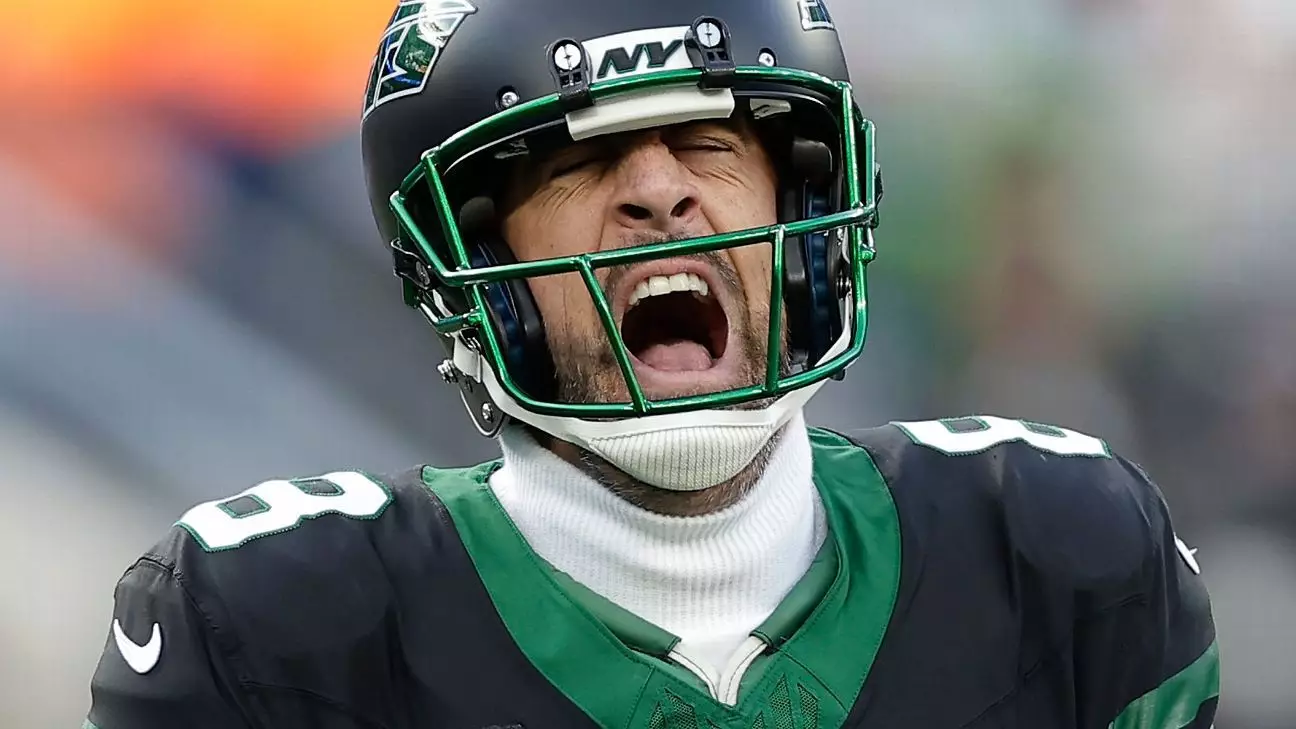The New York Jets are in the midst of a tumultuous season, with quarterback Aaron Rodgers at the forefront of the unfolding drama. As the team trudges through another disappointing campaign, the hallmarks of their struggles have become glaringly apparent. Following a painful 26-21 defeat to the Seattle Seahawks, it is increasingly evident that both Rodgers and the Jets are navigating uncharted territory—a zone where even an all-time great quarterback faces scrutiny and uncertainty regarding his future.
Rodgers, reflecting on a performance that could arguably be labeled one of his worst this season, exhibited the tell-tale signs of a player burdened with expectations but hindered by faltering execution. At nearly 41 years old, he completed 21 of 39 passes for just 185 yards, failing to break the 200-yard barrier for the third consecutive game. This lack of yardage is critical when analyzed within the context of his storied career, as it underscores not only a decline in play but also a potential disconnect between his prowess and the team’s overall performance.
The postgame atmosphere revealed a team grappling with internal questions and external criticisms. Interim coach Jeff Ulbrich’s lukewarm endorsement of Rodgers highlights a significant divergence from traditional expectations surrounding a player of his caliber. When pressed about Rodgers’ performance, Ulbrich’s decision to defer a comprehensive assessment to after reviewing game film suggests a reluctance to fully back his quarterback in a moment that could have called for unreserved support. The air of uncertainty this behavior generates is palpable, especially given the backdrop of speculations surrounding a potential quarterback change—speculations that were neither confirmed nor dismissed emphatically by Ulbrich.
Rodgers himself addressed these emerging concerns, noting, “I’ll have a conversation with [Ulbrich] if that’s what he’s thinking.” This statement encapsulates his subdued approach to the moment, indicating that he is aware of the precarious nature of his position. Instead of engaging in the usual bravado that he has exhibited throughout his career, Rodgers appeared contemplative, acknowledging that the circumstances have drastically shifted. His candid admission about wanting to continue playing—and feeling physically fit—contrasts sharply with the narrative that surrounds his declining on-field influence.
The game against the Seahawks spotlighted multiple missed opportunities—none more critical than a pivotal second-quarter interception that shifted the momentum away from the Jets. With the team poised to assert a commanding lead at 28-7, a thrown ball intended for an open Garrett Wilson sailed high, setting the stage for a devastating pick-six by former Jets player Leonard Williams. This moment served as a catalyst, converting a potential touchdown into a 92-yard interception return, an unprecedented feat for a defensive lineman and a dagger to the Jets’ hopes on that day.
Rodgers’ reflection on the interception reveals a deeper understanding of the stakes involved. “Those plays in the second quarter cost us the game,” he lamented, illustrating his awareness that one moment can redefine the trajectory of a match. The inability to capitalize on critical situations reflects a broader issue within the Jets’ offense—plagued by penalties and consistency problems, particularly during the crucial final moments of the game.
While the spotlight remains firmly on Rodgers, the contributions of others, such as running back Breece Hall, must not be overlooked. Hall’s fumble, which directly led to a scoring opportunity for the Seahawks, exemplifies the collaborative nature of the team’s struggles. In his postgame remarks, Hall expressed a profound sense of responsibility, signaling a level of accountability that mirrors the collective frustration within the team. “If I can’t take care of the ball, I shouldn’t be in the game,” he stated, illustrating the personal burden many players are shouldering as the team faces an unrelenting onslaught of defeat.
The aftermath of this loss has positioned the Jets in a precarious place, not just in terms of their standings but also concerning morale. As cornerback Sauce Gardner aptly put it, “It’s unacceptable, man.” The collective sentiment within the locker room echoes a desire for change but also an acknowledgment of the difficult path that lies ahead. As the season wears on, the Jets must either rally together to navigate this tumultuous chapter or face the sobering reality that one of the league’s most storied franchises may be facing its darkest hour.
In the end, it remains unclear whether this beleaguered team can turn the tide, finding a way to leverage their star quarterback’s talents—or if the combination of tensions, injuries, and miscalculations will ultimately consign them to the annals of frustration that have plagued their history. Only time will reveal the next chapter for Rodgers and the Jets, but it is clear that change is inevitable in the wake of such hardship.


Leave a Reply